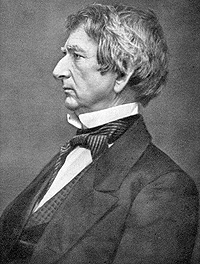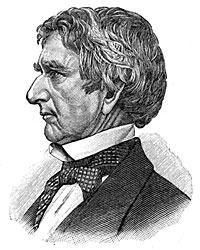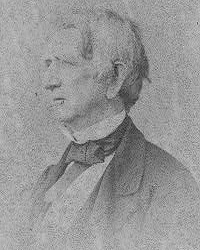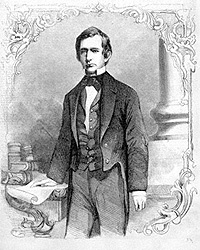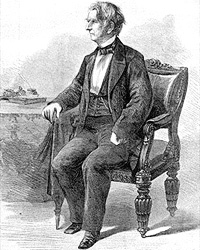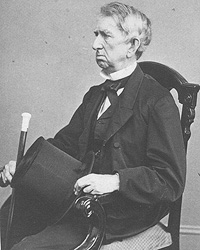“Frances Seward did not consider her husband a coward, but she could not understand his attitude toward emancipation. From the beginning of the war she longed for it, and was critical of Lincoln for placing the salvation of the Union before the freedom of the black man,” wrote Glyndon Van Deusen, biographer of President Lincoln’s Secretary of State, William H. Seward.1
Like Mary Todd Lincoln, Frances Seward had strong interests and opinions about issues and politics – and it appears that she and her husband never tired of discussing those topics through letters. But the Sewards were seldom in the same place very long. Like Mrs. Lincoln, Mrs. Seward resented her husband’s absences – even to the point of having a near affair early in their marriage (1832-33). But unlike Mrs. Lincoln , she had no political ambitions for her husband and would much have preferred him to choose family over politics. Like Mrs. Lincoln, she provided the formal religion for the family -– inducing Seward to join the Episcopal Church. Like Mrs. Lincoln, she became friends with Senator Charles Sumner -– but at a much earlier stage of his career. But Mary Todd Lincoln hated Seward, which she described as “dirty abolition sneak.” When Seward’s name was proposed for the Cabinet, Mrs. Lincoln said: “Never! Never! If things should go on all right, the credit would got to Seward – if they went wrong, the blame would fall upon my husband. Seward in the cabinet! Never!”2
Because Mary Todd Lincoln detested Secretary of State Seward, she snubbed Frances when the wife of the new Secretary of State paid a courtesy call on the White House. But the opportunities for such snubs were few; Mrs. Seward spent much of the Civil War in at the Seward home in Auburn, New York. That left the President and the Secretary of State in Washington – frequently without their wives. It is easy to see how the two functional bachelors could enjoy sitting before the fire in the “Old Clubhouse” on Lafayette Square and swapping stories – much as Mr. Lincoln enjoyed doing on the circuit. Unlike the other dour and self-important members of the Cabinet, Seward had a sense of humor. Furthermore, Mr. Lincoln must have enjoyed Seward’s cultural sophistication and linguistic expletives.
Like Mr. Lincoln, Seward shared an appreciation for Irish-Americans which many Republicans did not. Like Lincoln. Seward was not a nativist – although he was much more pronounced in his convictions than Mr. Lincoln. His support for immigration education when he was Governor of New York doomed his later presidential aspirations. Seward seemed to get less enjoyment out of his legal profession than Mr. Lincoln. He practiced law for profit, not pleasure. His early political career was a financial struggle – especially his two terms as Governor, during which he went heavily into debt in order to support an expensive lifestyle in Albany.
Like Mr. Lincoln, Seward had a natural self-confidence in his own abilities but that self-confidence was interpreted as egotism by his enemies. Like Mr. Lincoln, he suffered a mid-career bout of depression. And like Mr. Lincoln, he tended to assume the best in others. Like Mr Lincoln, Seward had left his boyhood home at an early age (to attend Union College and then abscond to Georgia to teach school) but unlike Mr. Lincoln he later reconciled with his father. Unlike Mr. Lincoln, however, Seward’s anti-slavery convictions (which spurred his opposition in the Senate to the Compromise of 1850) weakened rather than strengthened with age. When they met in 1848 and shared a hotel room in Worcester, “We spent the greater part of the night talking, I insisting that the time had come for sharp definitions of opinion and boldness of utterance. Before we went to sleep Mr. Lincoln admitted that I was right in my anti-slavery position and principles.”3
Historian Allan Nevins was unkind to Seward, saying, he “lacked the cardinal requisite of steady judgement: “His ‘higher law’ speech in 1850 was not only poor politics but bad statesmanship, and the ‘irrepressible conflict address of 1858 was still more unfortunate…Save in devotion to the Union, he seemed to lack constancy.”4 Nevins wrote: “Above all, he was an improviser. His whole genius, backed by irresistible personal force, was for meeting practical situations with some rapidly devised measure, taking little thought of ultimate consequences, and trusting to the country’s growth for remedying all defects.”5
Prior to the Civil War, Seward had enjoyed a reputation as one of the strongest advocates of emancipation – in part because of the “irrepressible conflict” speech he delivered in Rochester in October 25, 1858:
Our country is a theater which exhibits in full operation two radically different political systems: the one resting on the basis of servile labor, the other on the basis of voluntary labor of free men…Hitherto the two systems have existed in different States, but side by side within the American Union. This has happened because the Union is a confederation of States. But in another aspect the United States constitute only one nation. Increase of population, which is filling the States out of their very borders, together with a new and extended network of railroads and other avenues, and an internal commerce which daily becomes more intimate, is rapidly bringing the States into a higher and more perfect social unity or consolidation. Thus, these antagonistic systems are continually coming into closer contact, and collision results.
Shall I tell you what this collision means? They who think that it is accidental, unnecessary, the work of interested or fanatical agitators, and therefore ephemeral, mistake the case altogether. It is an irrepressible conflict between opposing and enduring forces, and it means that the United States must and will, sooner or later, become either entirely a slave-holding nation or entirely a free-labor nation.6
Biographer Glyndon Van Deusen wrote “Long before the war began, Seward had shaped his approach to the problem of slavery. He believed that it must be rooted out, first because it was bad for the nation, second because it was bad for the white population, and last of all because it was bad for the Negro. By 1858 he was convinced that, with the growing northern predominance in Congress, the battle was substantially won, that popular pressures north and south, together with the power of the free states in Washington, would slowly but inexorably doom the peculiar institution.”7Historian Allan Nevins wrote that after the “irrepressible conflict” speech, “Having blown too hot, he tried to blow too cold. The inconsistency revealed Seward’s greatest weakness, his want of any compelling sense of principle. He would take advanced and even reckless positions with an air of Hotspur courage, but he lacked the profound convictions of Lincoln and Sumner, Jefferson Davis and Stephens. His partial retraction did not mitigate the shock of his Rochester blast.”8
Seward reluctance was evidenced by his suggestions regarding the Emancipation Proclamation. Seward biographer Glyndon Van Deusen wrote: “When Lincoln read the draft of the final Proclamation to the Cabinet, Seward showed his fear of servile insurrection. He urged that the freedmen be enjoined ‘to abstain from all violence unless in necessary self-defense’ – a change the Lincoln adopted.”9 Seward was a practical man and like President Lincoln had a mistrust of purely symbolic gestures. On January 2, 1863, Senator Orville H. Browning dined with Secretary of State Seward. “I asked him why the cabinet did so useless and so mischievous a thing as to issue the proclamations which had been issued, the only effect of which was to unite and exasperate them in the South, and divide and distract us in the North. He replied by telling me an anecdote of a man who after the termination of the revolutionary war could not rest til he had a liberty pole raised in his village, and when asked by his neighbors what he wanted with a pole, and whether he was not as free without it as with it, he would always answer ‘What is liberty without a pole?’ And what is war without a proclamation?”10
Treasury official Maunsell B. Field received the background story on the proclamation of Emancipation directly from the Secretary of State. “Mr. Seward told me the story of the Emancipation Proclamation, and, as he related it, it was strikingly illustrative of this characteristic of Mr. Lincoln. Months before it was issued, it was the subject of constant discussion at the meetings of the Cabinet. Day after day the most earnest and acrimonious debates took place in relation to the propriety or impropriety of the President issuing such a proclamation. Although an attentive listener to these discussions of his Secretaries, Mr. Lincoln did not take an active part in them. So much was this the case that several, at least, of his advisers were very uncertain as to what his ultimate determination upon the subject would be. So bitter did the controversy grow, that it resulted, after a time, not only in a breach of personal, and to some extent even official relations between certain of the Cabinet officers, but eventually even in a prolonged discontinuance of Cabinet meetings. During the interregnum matters which had been usually discussed and disposed of at such meetings had to be settled by inter-departmental correspondence. One of the other Secretaries, with the obvious purpose of annoying – I use a mild word – Mr. Chase, addressed several very important official communications directly to me, ignoring the head of the Department. This condition of things lasted until one day Mr. Seward received an autographic letter form the President requesting him to attend, without fail, a meeting of the Cabinet which he proposed to hold on the morrow. All the other Secretaries received similar letters, and not one of them knew or entertained any confident conjecture about the particular purpose for which they were called together. At the appointed time Mr. Lincoln waited until they were all assembled, having been unusually reticent to the first comers. He then addressed them somewhat as follows: ‘Gentlemen, I have asked you to come here that I may have the opportunity of reading to you a proclamation which I am about to issue. Before proceeding to read it, however, I desire to say that not only do I not invite any discussion about the propriety or impropriety of its issue, but that I amunwilling to listen to any. My mind is made up. On the contrary, as to matters of form, I wish you all to make any suggestions that may occur to you.’ He then drew from his pocket a manuscript, and to the amazement of some, if not of all, there assembled, proceeded to read the Emancipation Proclamation. When he finished, for a while nobody spoke. Mr. Seward was the first to break the silence, and to recommend a verbal alteration. Mr. Lincoln adopted it without a word of objection. Other gentlemen suggested further changes. Mr. Lincoln accepted them all without discussion. When nobody had any more suggestions to make, the meeting broke up, and the Ministers soon dispersed. The next day the emancipation from slavery of four millions of human beings in the United States was published to the world. Mr. Lincoln had waited until the people were ripe for it; and what he had at first looked upon as inopportune, he had at last regarded as expedient and necessary.”11
Although not enthusiastic about the proclamation, Seward supported it as a military and diplomatic maneuver. Biographer Van Deusen wrote: “The Emancipation Proclamation was admittedly a military measure, designed to foster disaffection among the Negroes in the South, and to promote their use in the armed forces of the Union. Seward accepted it as a means to those ends. He sensed its importance in producing a favorable reaction abroad and utilized if for that purpose. It would also, he said, ‘reach a weakness in every nook and cranny of the insurrectionary region.”12
In late November 1863, Seward told presidential aide John Hay: “One half the world are continually busying themselves for the purpose of accomplishing Proclamations & Declarations of War &c which they leave to the other half to carry on out. Purposes can usually better be accomplished without proclamations. And failures are less signal when not preceded by sounding promises. The slave states seem inclined to save us any further trouble in that.”13
Footnotes
- Glyndon Van Deusen, William Henry Seward, p. 328-329.
- Allan Nevins, The Emergence of Lincoln, Volume I, p. 411.
- Glyndon Van Deusen, William Henry Seward, p. 333.
- Theodore Calvin Pease, editor, Diary of Orville H. Browning, Volume I, 1850-1864, p. 609 (January 2, 1863).
- Maunsell B. Field, Memories of Many Men and of Some Women, p. 264-266.
- Glyndon Van Deusen, William Henry Seward, p. 333.
- Michael Burlingame and John R. Turner Ettlinger, editor, Inside Lincoln’s White House: The Complete Civil War Diary of John Hay, p. 116 (November 22, 1863).
- Glyndon Van Deusen, William Henry Seward, p. 332.
- John M. Taylor, William Henry Seward: Lincoln’s Right Hand, p. 187.
- John M. Taylor, William Henry Seward: Lincoln’s Right Hand, p. 74.
- Allan Nevins, The Emergence of Lincoln, Volume I, p. 22.
- Allan Nevins, The Emergence of Lincoln, Volume I, p. 24.
- The Works of William H. Seward, Volume IV, p. 292.




